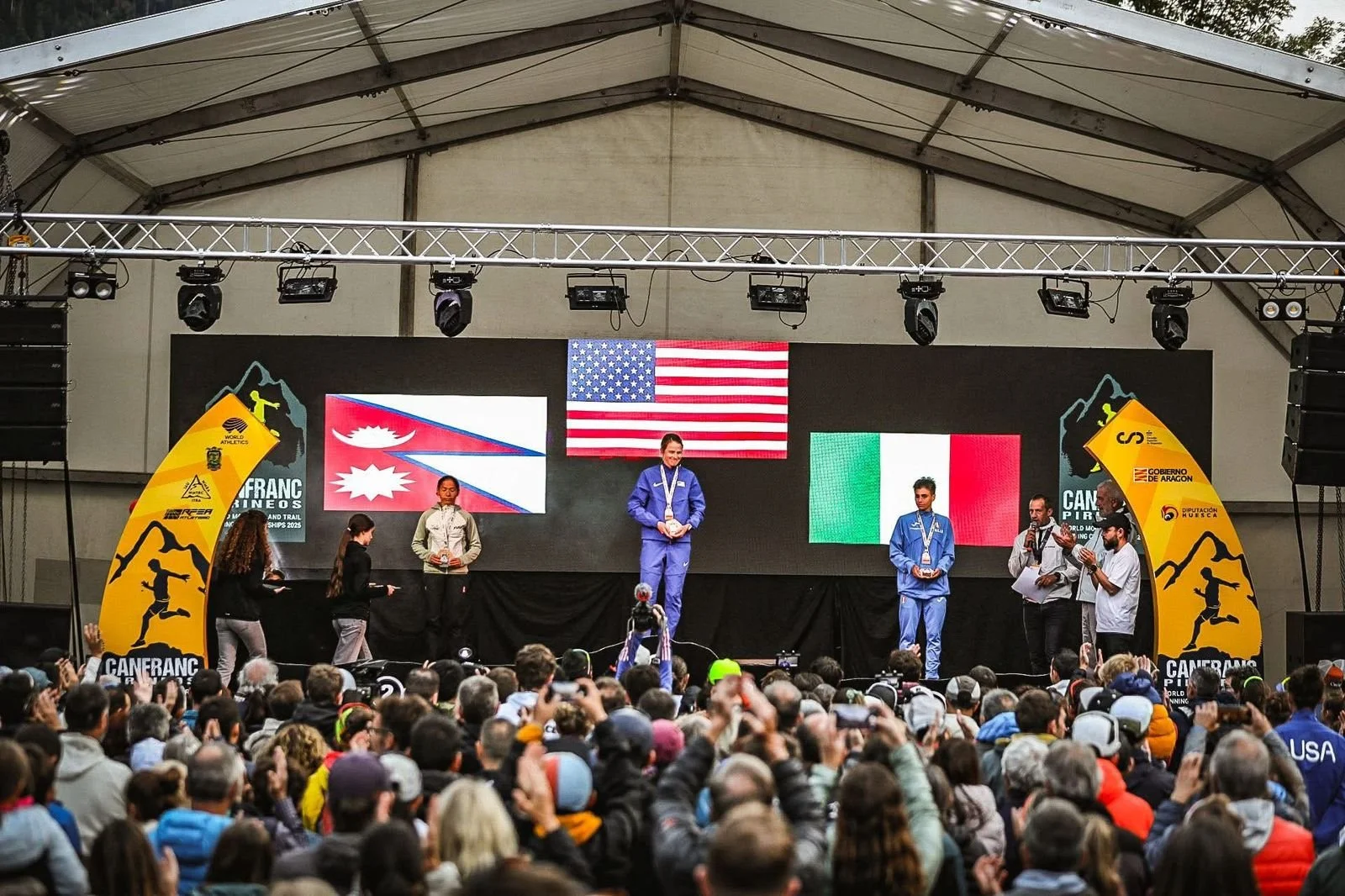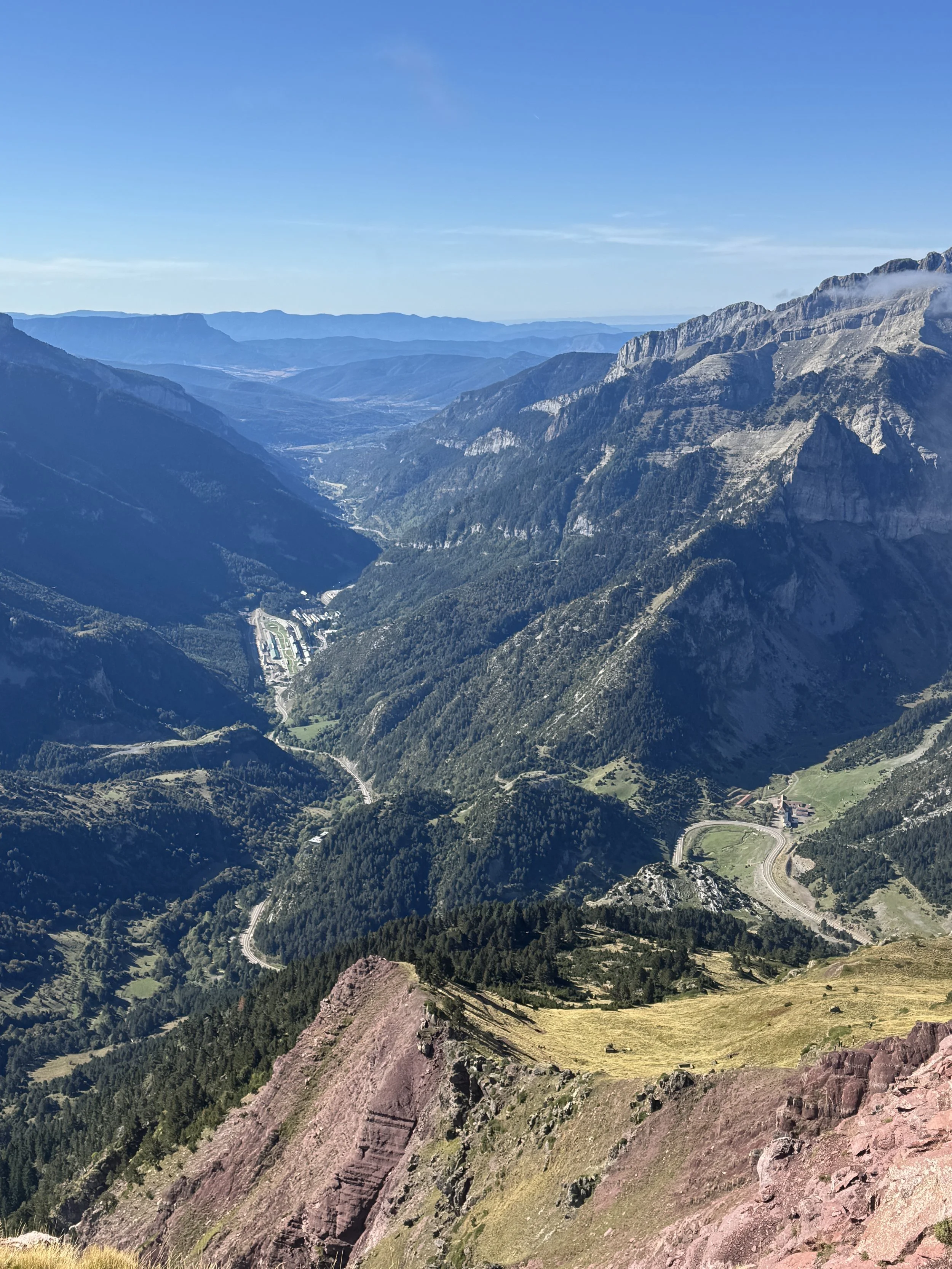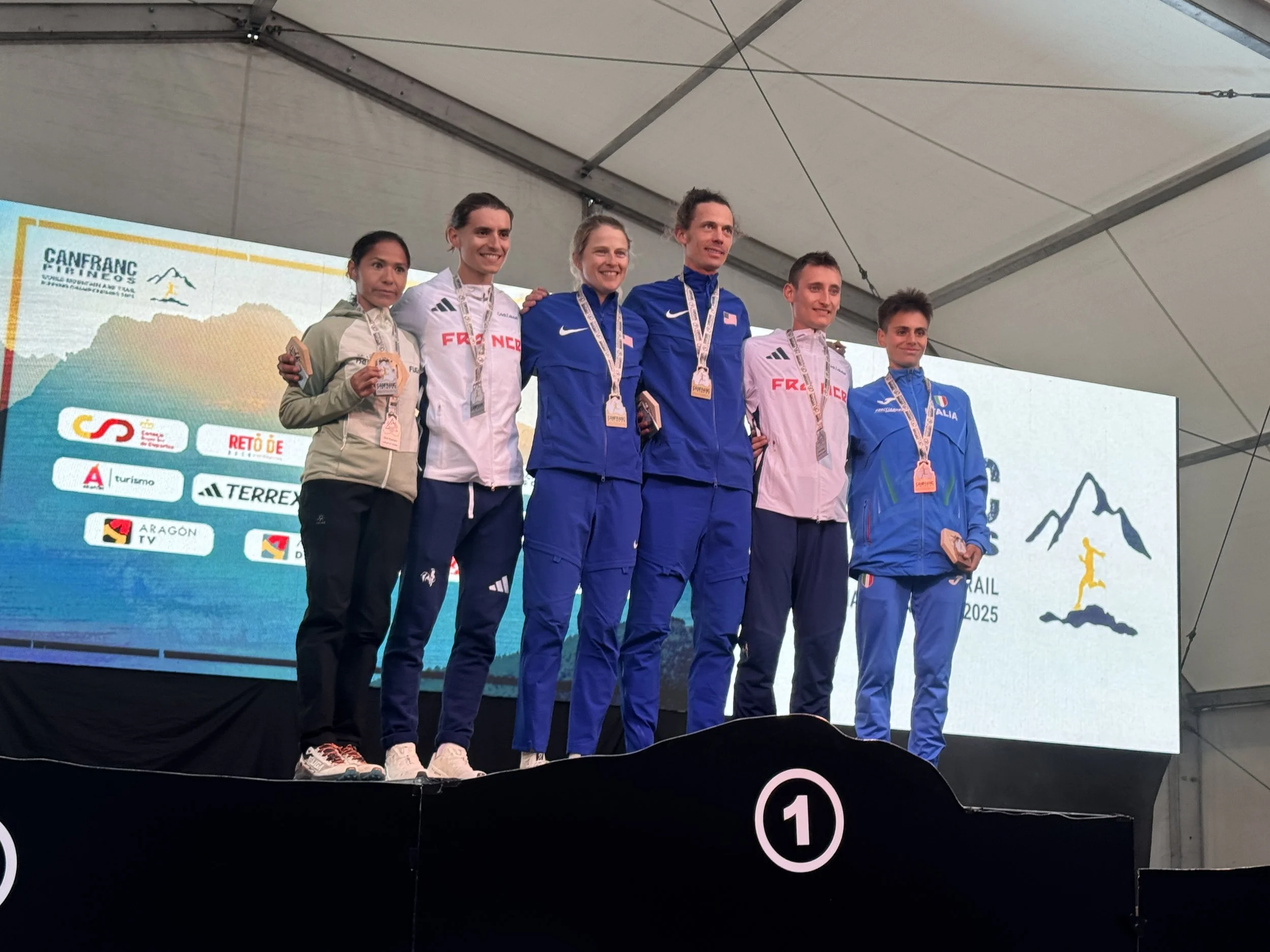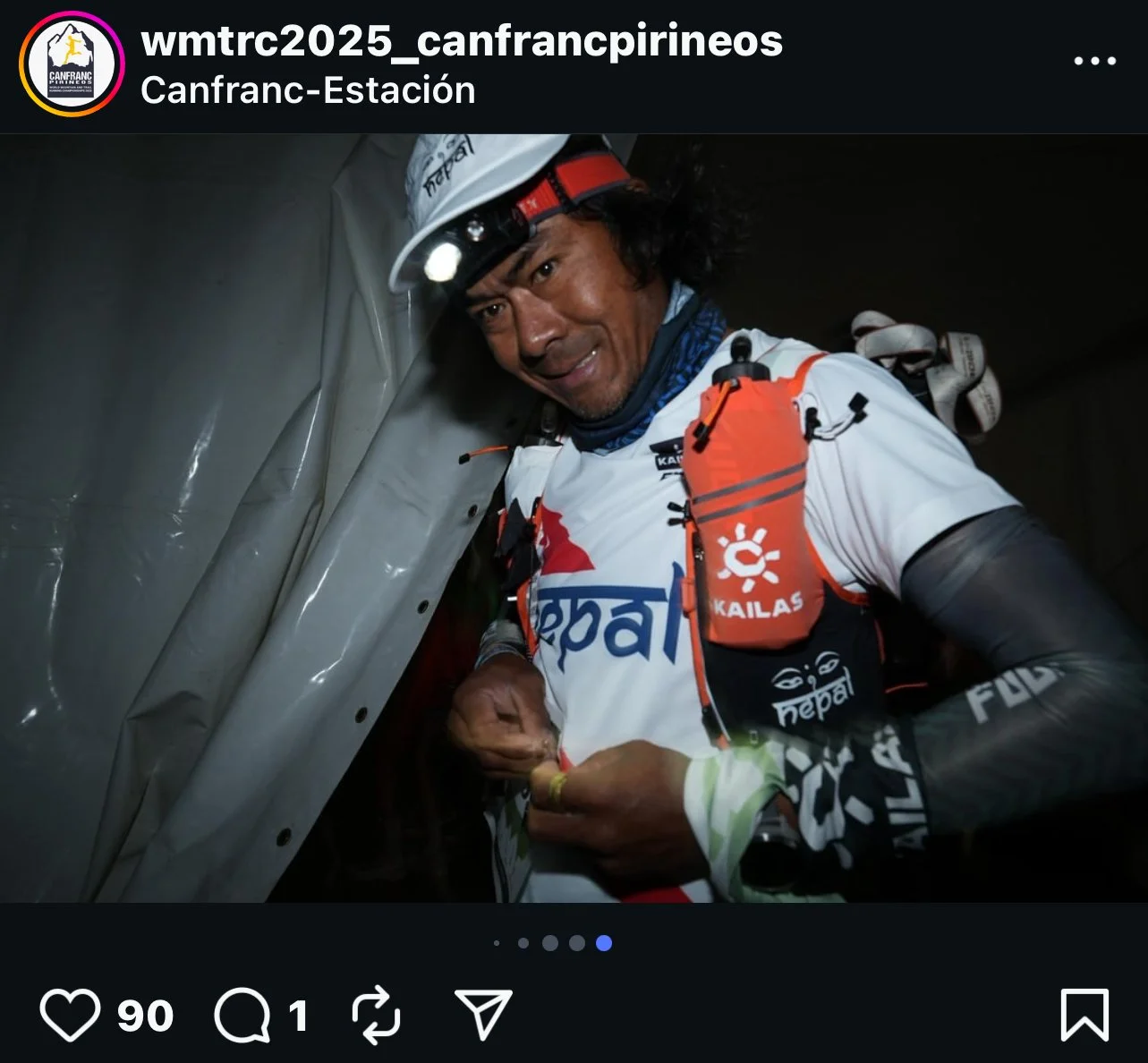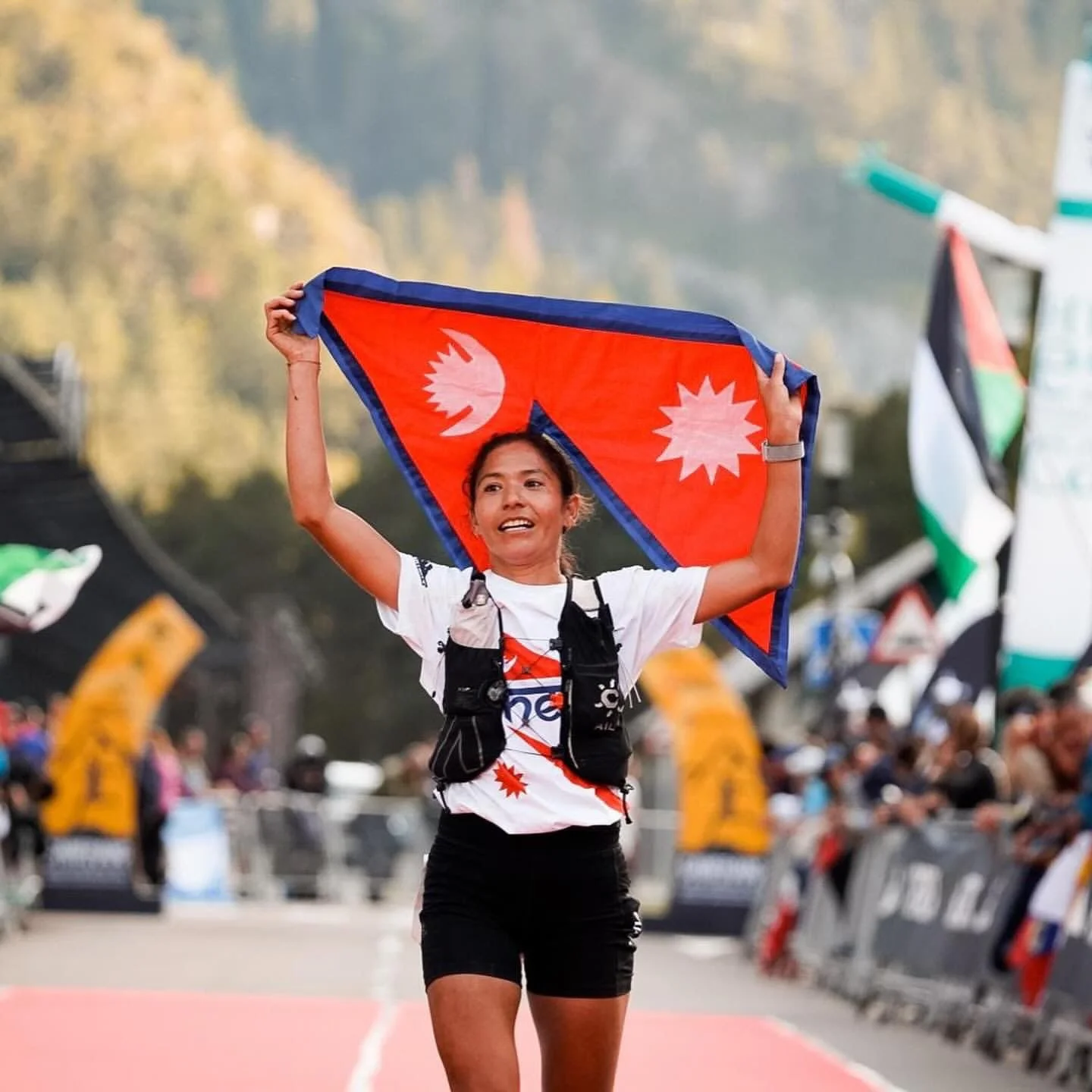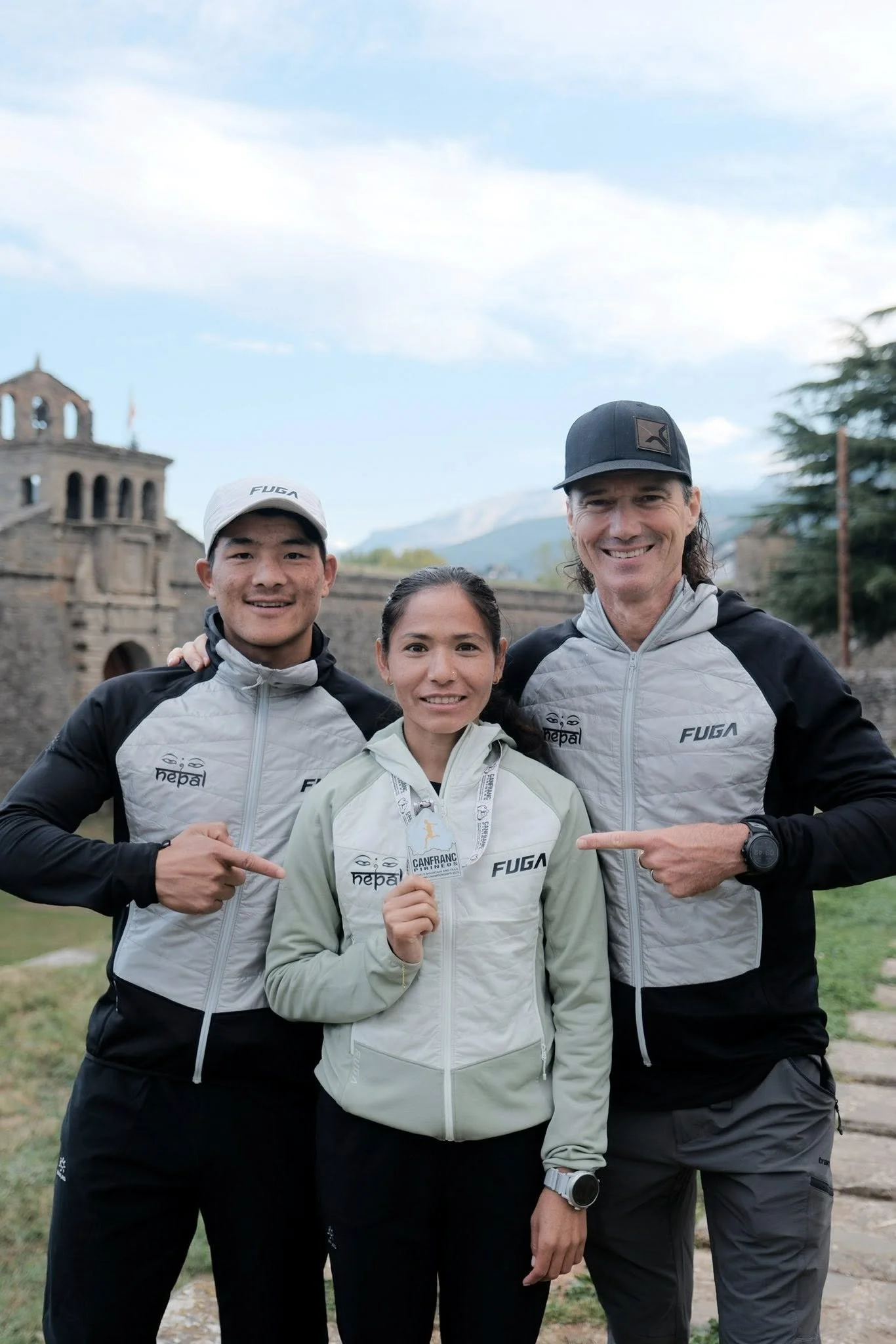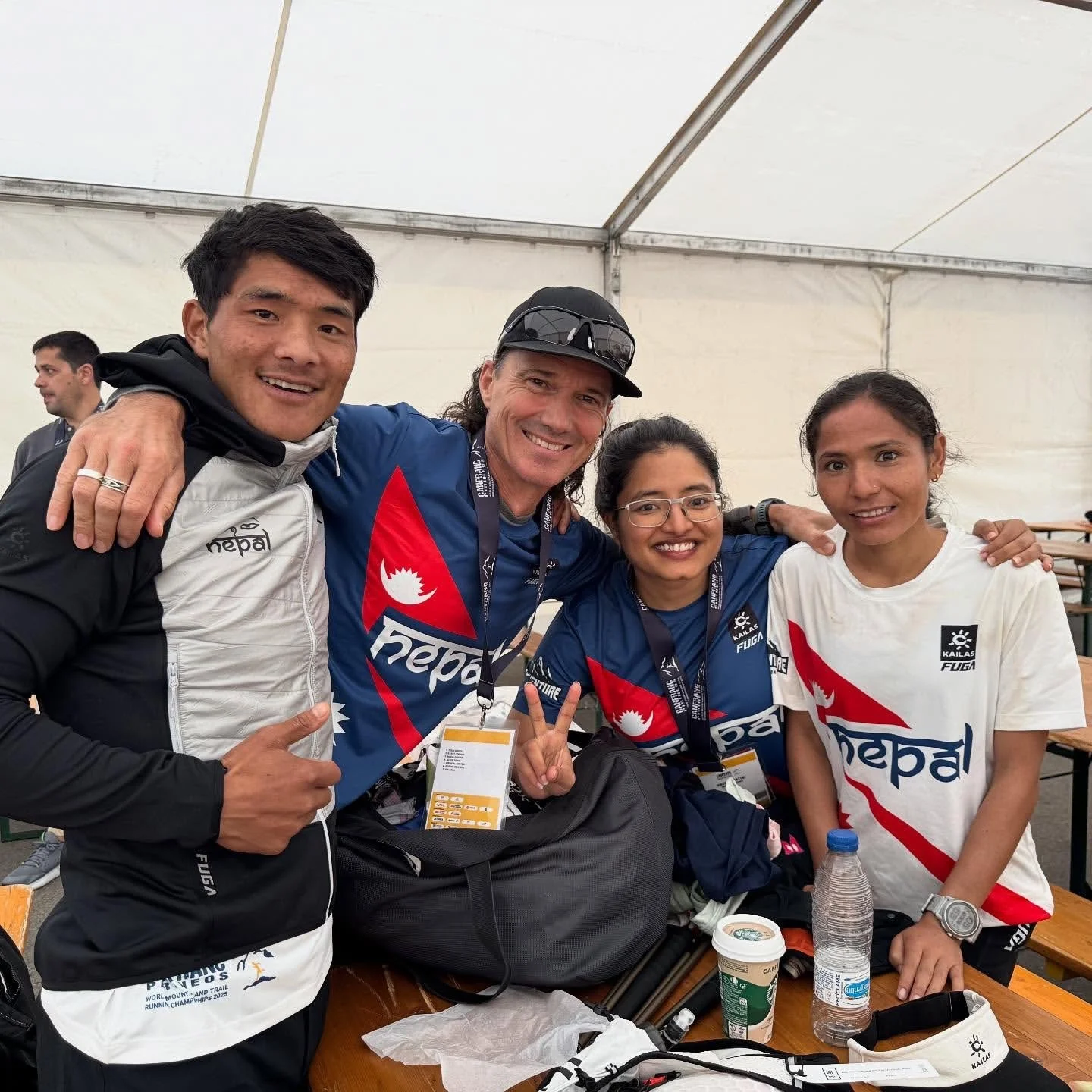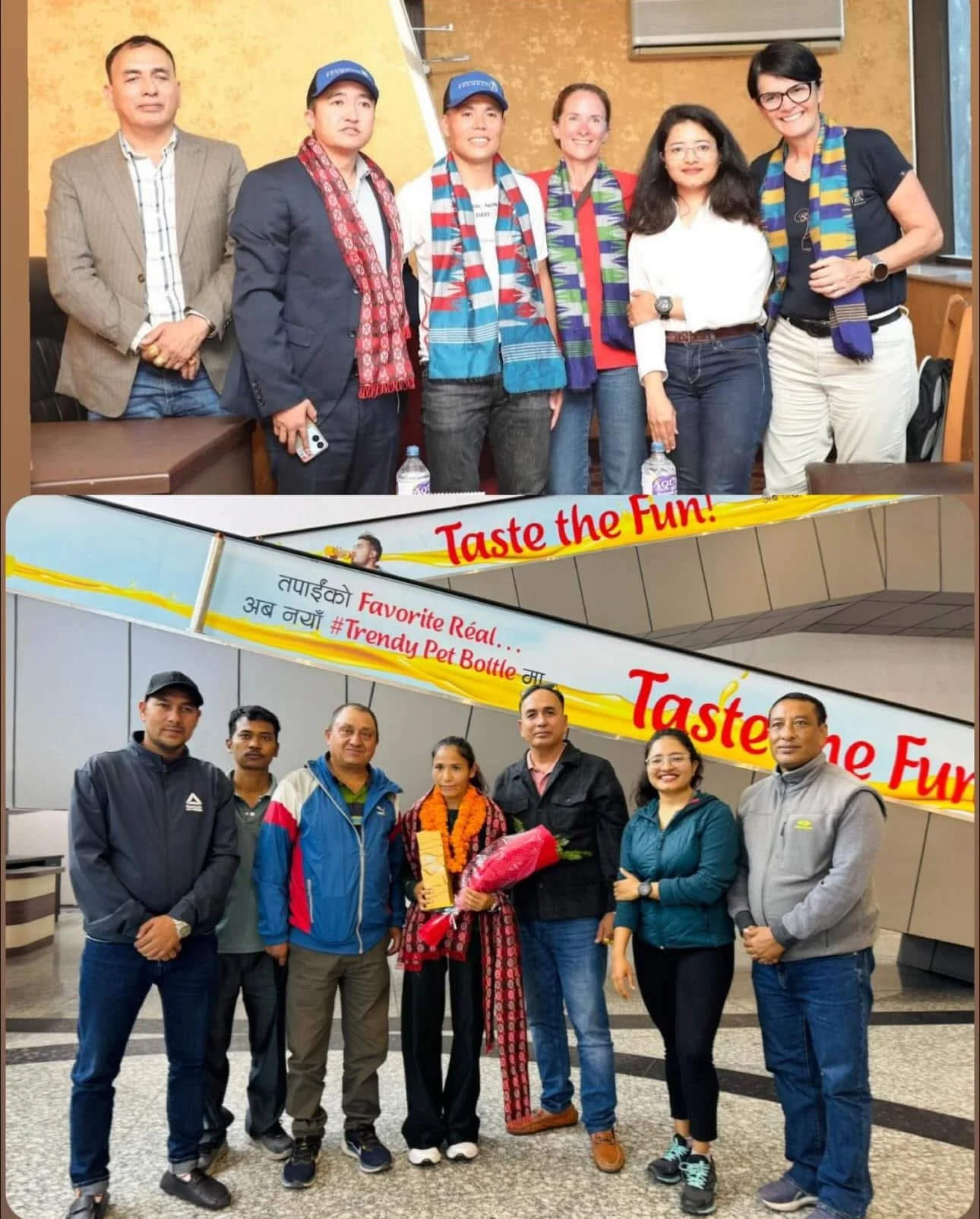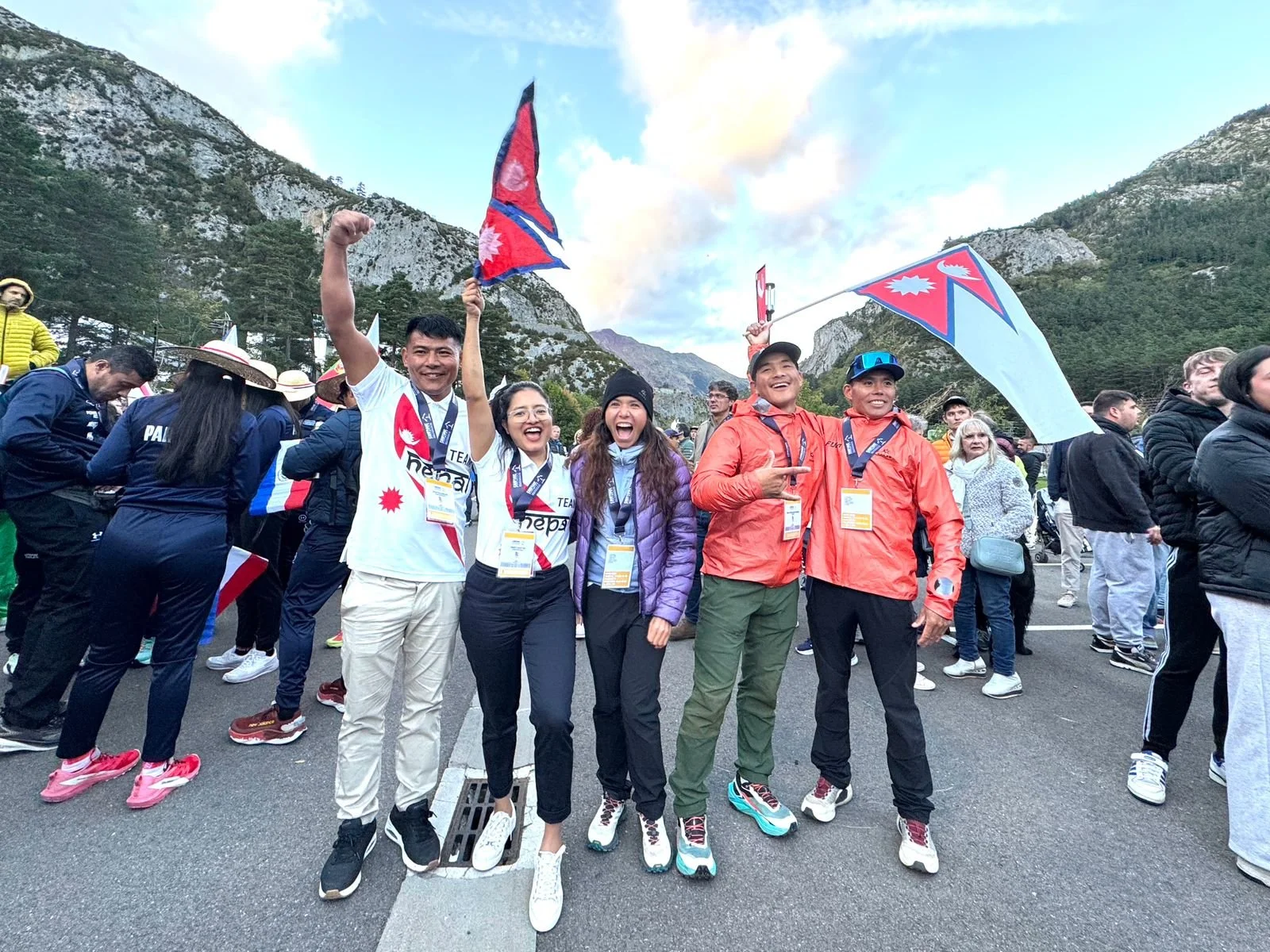Nepal storms the 3rd World Mountain and Trail Running Championships 2025, Can Franc, Spain
Historic Performance at 2025 Trail World Championships- a PERSPECTIVE
Image courtesy : 2025 WMTRC, Can Franc Facebook , Long trail winners female [ 1st Katie Schide USA, 2nd Sunmaya Budha Nepal , 3rd Fabiola Conti Italy
Canfranc-Pirineos, Spain — While Nepal's streets erupted with frustrated Gen Z in September and political upheaval dominated headlines—with mass protests on September 8-9 leading to Prime Minister K.P. Sharma Oli's resignation within 48 hours—a different kind of breakthrough was quietly unfolding on mountain trails in Spain and cricket pitches in the UAE.
As the nation grappled with constitutional crisis and the formation of a new government under Sushila Karki, Nepali athletes were writing their own historic chapters far from the political chaos. On September 27, Nepal's cricket team stunned the sporting world with their first-ever victory against a Full Member nation, defeating two-time World Cup champions West Indies by 19 runs, then crushing them by 90 runs two days later to seal a historic 2-0 series victory.
On the same day- the most remarkable achievement came in the Spanish Pyrenees, where Sunmaya Budha stood on a podium alongside American and European champions, clutching a silver medal from the 3rd World Mountain and Trail Running Championships. It was a moment that transcended sport: no Asian athlete had ever finished this high in the Long Trail competition at the World Championships.
While politicians debated Nepal's future in Kathmandu, these athletes were busy securing it on the global stage—proving that even in moments of national crisis, Nepali excellence knows no bounds.
The Ultimate Test: 82K Through the Pyrenees
Photo Courtesy : Preeti Khattri
The Long Trail event at the 2025 World Championships was designed to break even the strongest athletes. Stretching 82 kilometers (50.9 miles) through the Spanish Pyrenees, the course featured an unrelenting 5,413 meters (17,760 feet) of elevation gain and descent—
the equivalent of scaling from sea level to above Mount Everest's Camp 3, then descending all the way back down.
To put this in perspective for recreational runners: the technical terrain meant constant climbing and descending on rocky, exposed trails with no flat sections for recovery. Athletes faced everything from steep scree slopes to narrow ridge lines, from boulder fields requiring scrambling to precipitous descents demanding total concentration. One misstep could mean injury; one lapse in focus could cost minutes or worse.
Breaking Down the Numbers: Understanding Elite Pace
The long trail winning family at the 3rd World Mountaina and Trail Running Championships 2025 | Photo Courtesy : Preeti Khattri
To truly appreciate what these athletes accomplished, let's examine the mathematics of the winner’s performances and Nepal’s performance.
Women's Competition
Katie Schide (USA) - Winner
Time: 9:57:59
Average pace: 7:18 per kilometer (11:44 per mile)
Moving at this pace while ascending over 5,400 meters is extraordinary
Sunmaya Budha (Nepal) - Silver Medal
Time: 10:23:03
Gap behind winner: 25 minutes and 4 seconds
Average pace: 7:36 per kilometer (12:14 per mile)
Lost only 18 seconds per kilometer to the world champion
For context: Most recreational trail runners would need 18-24 hours to complete this course, if they could finish it at all. Budha's pace means she was running at a speed that most casual runners couldn't maintain on flat pavement—except she was doing it while constantly climbing and descending mountains.
Men's Competition
Jim Walmsley (USA) - Winner
Time: 8:35:11
Average pace: 6:17 per kilometer (10:07 per mile)
An astonishing pace given the technical terrain
Suman Kulung (Nepal) - 32nd Place
Time: 10:06:25
Average pace: 7:24 per kilometer (11:54 per mile)
Finished 1 hour 31 minutes behind the winner
Best performance by an Asian male athlete
ITRA Nepal Rank: 1st (ITRA score: 861)
Man Kumar Roka Magar (Nepal) - 37th Place
Time: 10:10:53
Average pace: 7:27 per kilometer (11:59 per mile)
Finished just 4.5 minutes behind Kulung
ITRA Nepal Rank: 4th (ITRA score: 824)
Sangge Sherpa (Nepal) - 116th Place
Time: 12:33:09
Average pace: 9:11 per kilometer (14:46 per mile)
ITRA Nepal Rank: 2nd (ITRA score: 835)
The final four Sangge Sherpa , Sunmaya Budha, Suman Kulung, Man Kumar Roka Magar , Nepali team who finally made it to the World Championships 2025 | Photo courtesy : Preeti Khattri
To understand the brutality: The men's winner averaged about 6:17/km on a course where elite mountain runners were struggling. Kulung and Roka Magar maintained a 7:24-7:27/km pace—faster than many recreational runners' easy flat road pace—while navigating extreme elevation changes and technical terrain for over 10 hours. They were faster than dozens of European athletes who train in the Alps and other major mountain ranges.
Sangge Sherpa organising himself post gear check in Can-Franc
Even Sherpa's 9:11/km average pace over 12+ hours represents an extraordinary feat of endurance, maintaining forward progress on some of the most challenging mountain terrain in competitive trail running.
Budha's Historic Silver: A Masterclass in Mountain Running
Sunmaya storming in 2nd position- Image Courtesy wmtrc2025 canfranc Facebook
“What set Budha apart was her exceptional descending ability. She recorded the fastest downhill speed among all women in the competition—a skill honed through years of training on Nepal’s steep mountain trails. ”
Sunmaya Budha, ranked world 8th for 100 km category events and 17th in the world by the International Trail Running Association (ITRA), entered the race having recently recovered from injuries to both legs. Under the expert guidance of her Team Director Ryan S. Blair and coach Andy Dubois, she worked through the setback and executed a nearly flawless tactical race.
While American Katie Schide dominated from the front, Budha found herself in an intense battle for second place with Italy's Fabiola Conti, a specialized skyrace and mountain marathon runner. The two runners remained locked together through much of the course, running side-by-side at key checkpoints and pushing each other through the mountain wilderness.
In ultra-trail racing, where climbs are often won by fractions of minutes, the ability to descend fearlessly and efficiently can make the difference between podium positions. Budha's technical prowess on the descents gave her a decisive advantage over her European competitors.
The decisive moment came in the final 20 kilometers. At the 65-kilometer mark at Candanchu, Budha held a 90-second lead over Conti. By Llano de Tortiellas Alto at 71.5 kilometers, she had extended her advantage to eight minutes—a commanding gap she maintained to the finish, likely built on her superior descending through the technical latter sections of the course.
Budha crossed the line in 10:23:03, finishing 25 minutes behind Schide's winning time of 9:57:59. Notably, Budha recorded the fastest downhill speed among all women competitors, showcasing her exceptional technical descending skills—a crucial advantage for runners who grew up navigating the steep mountain trails of Nepal. In a powerful display of national pride, she approached the finish wrapped in the Nepali flag, showing the world what Himalayan athletes can achieve on the global stage.
According to Preeti Khattri, team lead for Nepal at the championships: "Standing right beside the USA and European peer. Proud. No Asian athletes have ever made it this far! "
The Men's Breakthrough: Kulung and Roka Magar top asian athletes
While Budha captured headlines with her silver medal, the performances of Suman Kulung and Man Kumar Roka Magar were equally significant. Both athletes topped amongst Asian athletes and numerous European competitors who train year-round in the Alps, Pyrenees, and other world-class mountain ranges.
Suman Kulung's Remarkable Recovery to 32nd Place
Kulung, supported by the Dr. Sigrid Foundation in Austria, delivered a performance that demonstrated extraordinary mental toughness and racing intelligence. What makes his 32nd place finish even more impressive is the adversity he overcame during the race.
At approximately 1.5 kilometers into the course, Kulung encountered a severe bottleneck caused by congestion on the narrow technical trails. This critical delay pushed him back to around 92nd position—a devastating setback in a world championship race where every second counts. Many athletes would have been demoralized by such an early disaster.
Suman Kulung coming through 65 km Assisted Checkpoint Picture Credit : Dr Sigrid Foundation
But Kulung showed why he is Nepal's top-ranked trail runner. Rather than accepting defeat, he launched a spectacular comeback. By the 30-kilometer mark, he had charged through the field to reach approximately 20th position—recovering over 70 places in less than 30 kilometers of racing. This meant he was not only making up for lost time but actively passing some of the world's best trail runners on challenging mountain terrain.
His final time of 10:06:25 placed him:
Ahead of runners from traditional mountain running powers including Switzerland, Austria, and Germany
As the highest-finishing Asian male athlete in the competition
In the top third of finishers in one of the deepest fields ever assembled
Kulung's ability to maintain composure after the early setback, execute a strategic recovery, and finish strong showcases the complete skill set required for championship-level trail running: technical ability, physical endurance, and most importantly, mental resilience.
Man Kumar Roka Magar's 37th Place Finish
Asia Pacific Adventure Nepali Team with the Team Director Ryan S. Blair. Picture credit- APA Fb page
Man Kumar Roka Magar's performance was remarkable for its consistency and tactical intelligence. Finishing in 10:10:53—just 4 minutes and 28 seconds behind Kulung—Roka Magar demonstrated the depth of Nepal's trail running program. Ranked 4th in Nepal according to ITRA with a score of 824, Roka Magar has been one of Nepal's most celebrated trail runners, consistently performing at international events including a 5th place finish at the 2024 Asian Trail Running Championships.
His ability to maintain such a close pace to Kulung throughout the grueling course showed exceptional pacing strategy and mental fortitude, proving his status as one of Nepal's elite mountain runners.
Sangge Sherpa's Determined Effort
Sangge Sherpa, ranked 2nd in Nepal with an ITRA score of 835, completed the brutal course in 116th position. As one of Nepal's most celebrated athletes and an elite Kailas team ultra-trail runner, Sherpa's participation itself was significant. Born in the mountains of Taplejung in 1981, Sherpa brought decades of mountain experience to the race.
While his finishing position didn't reflect his typical performances, completing this extraordinarily difficult course against the world's best trail runners is an achievement in itself. The Long Trail's technical demands and the depth of competition—featuring over 100 of the world's top male trail runners—made every finish a testament to determination and skill.
Together, Kulung, Roka Magar, and Sherpa proved that Nepal can field multiple competitive athletes at the world championship level, not just in the women's field.
Team Nepal: 17th Overall, Just 16 Minutes Behind Japan
In the team competition, Nepal's performance exceeded all expectations. The team finished 17th overall among nations, remarkably close to Japan's 16th place finish—separated by just 16 minutes after more than 10 hours of racing.
This achievement is particularly significant given that:
Japan has a well-established mountain running infrastructure with decades of development
Japanese runners regularly compete in major European races throughout the year
Nepal's trail running program is relatively young but developing rapidly
The narrow gap between Nepal and Japan suggests that with continued support and development, Nepal could become a consistent force in international trail running within the next few years.
Overcoming Adversity
Nepal's participation came despite significant challenges:
Two additional athletes—Arjun Kulung Rai and Rammaya Budha—were unable to compete due to visa complications, reducing Nepal's representation
Sunmaya Budha competed while still recovering from bilateral leg injuries
Limited access to high-altitude training facilities similar to European training centers
Minimal government support compared to traditional trail running nations
Video footage from the race showed Budha's remarkable efficiency, taking on nutrition in mere seconds at aid stations to minimize time loss and maintain momentum.
Global Competition Context
The championships attracted approximately 1,700 athletes from 80 countries, making it the largest field in the event's history. The Long Trail competition featured some of the world's premier trail runners:
Katie Schide's 9:57:59 winning time continued her remarkable dominance, having won Western States 100, UTMB, and Hardrock 100 in recent years
Jim Walmsley's 8:35:11 victory further cemented his status as one of trail running's all-time greats
Marion Delespierre (France), the defending women's champion, finished eighth
Francesco Puppi (Italy), winner of this year's CCC at UTMB, finished ninth
In team competitions:
Italy won the women's team gold, with USA second and France third
France claimed the men's team title, with USA second and Italy third
What This Means for nepali Trail Running
Nepal's breakthrough at the 2025 World Championships represents more than individual achievements—it signals a fundamental shift in the global trail running landscape. For decades, the sport has been dominated by North American and European athletes who benefit from proximity to major mountain ranges, established training infrastructure, and robust sponsorship systems.
Budha's silver medal and the men's top-40 finishes demonstrate that:
Altitude and mountain experience matter: Growing up and training in the Himalayas provides unique advantages which needs further sharpening.
Natural talent exists globally: With proper support, Asian athletes can compete at the highest levels
The sport's future is increasingly international: Traditional powers must now contend with emerging nations
supporting the professional trail and mountain running ecosystem
While mainstream sports like cricket and football might attract a lot of attention and sponsorship, Nepal’s strength in attaining victory in the mountain and trail running championships is remarkably attainable and much beneficial for the entire trail tourism industry. The performances of Nepali athletes in the international championships has put Nepal as the attractive destination for trail running globally. This is a whole new product and package for trail running tourism which has grown more than 300 % in the global sports tourism industry.
This is a sport that needs multidimensional attention and support, it embraces tourism, sports, trail infrastructure and informed reporting from the media.
Despite being a very small team of just four athletes, the supporting crew were equally as important for the athletes as their own hard work and determination.
Asia Pacific Adventure Group has mentored Sunmaya Budha since 2020 and coached under elite coach from Austrlia, Andy Dubois Mile27. She has had her best performances groomed by the duo coach and team director Ryan S. Blair.
Man Kumar Roka Magar is also being mentored under the APA and Andy since summer 2025 and his performance in the world championships reflects the result of following the professional guidance.
Suman Kulung is mentored under the expert guidance of Austrian , Dr Sigrid through the Dr Sigrid Foundation and coached by former Red Bull Soccar team Salzburg Coach Harald Viertlmayr
Man Kumar, Sunmaya Budha mentored by Ryan S. Blair, APA Team Director and local management Preeti Khattri
Suman Kulung with Dr Sigrid Foundation team.
As the Mountain and Trail Running as sport has gained exponential popularity and growth globally in past decade, there is a constant advocacy for the sport to be included in the Olympic games. The World Mountain and Trail Running Championships has been the initiation ground for making the inclusion of the sport in Olympics in the near future. Organised under the partnership of World Athletics, World Mountain Running Association, International Trail Running Association and International Association for Ultrarunners, this event which takes place bi-annually is a significant championships where coordination with the National sports bodies are necessary for the team nomination and representation.
National visibility is given formal weightage than the individual sponsorships. In this light, this was the first ever formal team to represent team Nepal in the World Championships with the backing of Nepal Adventure Running Federation.
Since 2023 Tap Out Fitness center and SnS Physiotherapy has been supporting the APA athletes in Nepal for receovery trainings and cross workouts.
Nepal Adventure Running Federation members with Suman Kulung, Dr Sigrid team and recieving Sunmaya Budha . Photo credits : Khelpati news
TRAINING FACILITY AT HOME
Despite the low media attention and media within the country-
various fitness centers like Tap Out fitness center, SnS Physiotherapy center, Athlete Enhancement center run by Dr. Sudin Maharjan, have been quite instrumental in supporting the cross workouts, physiotherapy and recovery facilities for the seasoned and upcoming trail runners in Kathmandu.
Nepal Trail Series Pvt Ltd has been instrumental in the administration and management of the Elite athletes and sponsor coordination for more than five years. It’s been a constant learning experience for understanding the professional trail running ecosystem and process to take the athletes to elite status and to keep them there.
The historic Nepali performance has not quite gained momentum in Nepal amidst all the revolution and natural disasters in the country. However, for those who are passionate followers of the sport, our achievement at Canfranc-Pirineos have raised expectations for Nepal's trail running future. Questions we need to ask include:
Can Nepal build on this success at the 2027 World Championships?
Will there be an increased national attention and more sponsorship and technical support from within Nepal or Nepali diaspora?
How many more talented Nepali runners are waiting for opportunities to compete globally?
As the trail running world celebrates these achievements, attention now turns to supporting and developing the next generation of Nepali runners. With proper resources, coaching, and international race opportunities, Nepal could become a consistent podium threat at future World Championships.
Championship Statistics Summary:
Total Athletes: ~1,700 from 80 countries
Course Distance: 82 kilometers (50.9 miles)
Elevation Gain/Loss: 5,413 meters (17,760 feet)
Winning Times: Walmsley 8:35:11, Schide 9:57:59
Nepal's Medals: 1 silver (Budha)
Nepal's Team Ranking: 17th overall (16 minutes behind Japan)
Best Asian Male Finish: Kulung 32nd, Roka 37th
At the Opening Ceremony National Parade of the 3rd Edition of World Mountain and Trail Running Championships. Nepali crew-Suman Kulung (Athlete), Man Kumar ( Athlete), Sunmaya Budha ( Athlete) , Preeti Khattri ( Team Lead), Jiten Rai ( Team Support) | Picture Credit Dr Sigrid.
The next World Mountain and Trail Running Championships are scheduled for 2027 at Cape Town, will Team Nepal maintain the breakthrough?
